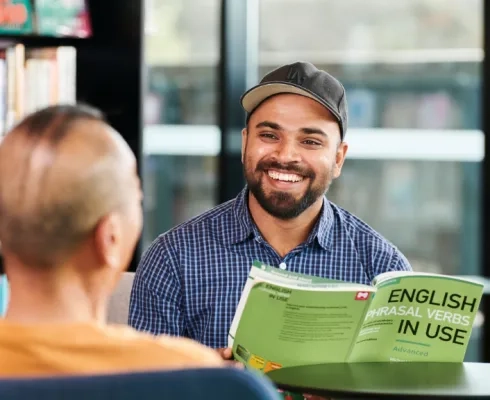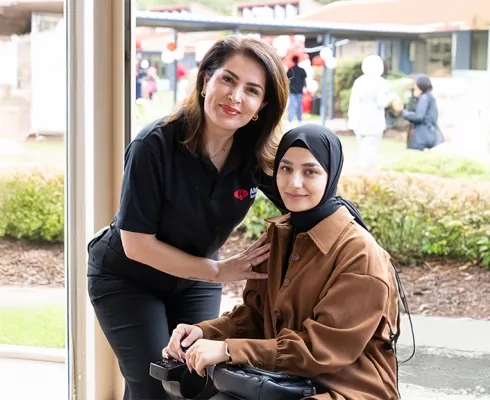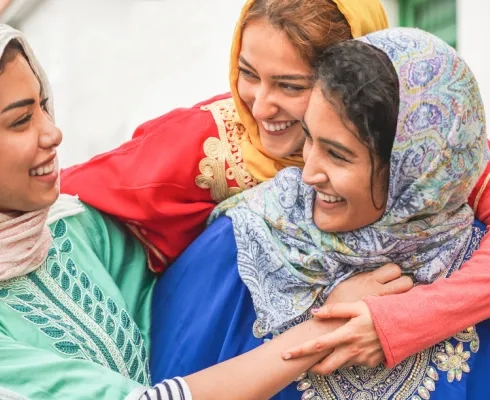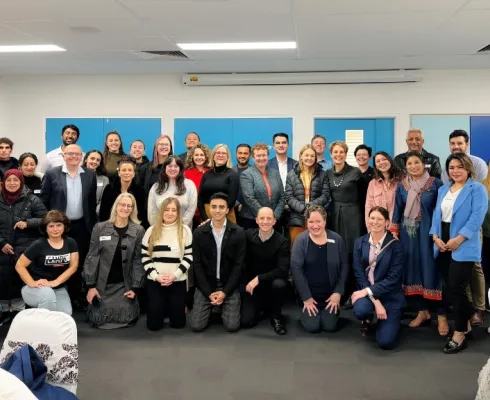“Mine is a very sad story,” says Hao Quach.
Sitting outside a café in Footscray almost forty years since he fled his homeland, the former Vietnamese refugee is reflecting on his life as a naval officer, labour camp prisoner and boat person forced to flee everything he had known and loved.
But he says the sadness has been tempered over the years by the lives his children have been able to build in Australia.
After surviving a brutal war, four years in a gulag, a perilous journey though pirate invested seas and thirty years of backbreaking factory work, Hao’s says his greatest achievement are his three sons.
One son Nam Hoang, sitting beside him in the café, is an engineer working in renewable energy and recently was the Mayor of Footscray.
Another son is a teacher and farmer who is active in refugee support groups and the other runs his own catering business.
Echoing a familiar migrant sentiment, Hao says that since leaving Vietnam his life has been all about his sons.
He says his own early life was uneventful. But like millions of others, it was completely and irreversible changed by the advent of the Vietnam War.
“Growing up I had a normal life, my parents ran a business. School was free and I loved learning,” he says.
“But I finished high school in 1968 just after the Tet offensive.”
The offensive was a campaign of surprise attacks by the North Vietnamese army and Viet Cong guerillas against military and civilian command and control centres throughout South Vietnam timed to coincide with the Vietnamese New Year, or Tet, holiday.
“This was a massive attack that really brought the war into people’s lives and woke up the country. After Tet the war intensified,” Hao said.
“All boys of military age had to go into the services. So, I joined the navy.”
Hao was sent to study navigation and ship handling at the US Navy’s Naval War College at Newport, Rhode Island, and then served aboard a warship patrolling coastal waters off South Vietnam for five years.
The patrols were aimed at stopping the North Vietnamese delivering weapons to the Viet Cong guerrillas operating in the South.
They were so successful that the North Vietnamese sought another way move arms. This led to the creation of the infamous Ho Chi Minh trail – a series of jungle paths that would through Laos and Cambodia along which the North Vietnamese supplied arms to the Viet Cong in the South.
“We patrolled from the 17th parallel south to the Gulf of Thailand,” Hao said.
Nineteen seventy five saw him back at naval college in Saigon as the war took a turn for the worse.
“It was a terrible time, very hard. The communists were closing in and everyone was afraid for the future,” Hao said.
When the communists took control Hao, along with thousands of other South Vietnamese servicemen, officials and business people, was sent to a ‘re-education camp’.
“This was really a forced labour camp. They didn’t kill you with a gun or a knife but they killed you in a different way,” Hao said.
“We were made to do hard labour from early in the morning until late at night. A lot of former South Vietnamese soldiers died in that camp.”
Hao spent four interminable years in the camp.
“I was lucky. Some people spent decades in these camps. They were designed to break your will,” he said.
When he was in the camp, Hao’s wife Le-Ha was virtually a single mother left to bring up the couple’s first son Nam Do.
While most South Vietnamese lost their jobs as socialism and wealth redistribution was imposed on the south, because the communists needed to keep the banking system operating Le-Ha kept her job working in a bank.
But the communists confiscated most of her property and even commandeered her house while Hao was in prison
Upon his release from the labour camp Hao knew immediately he could not remain in his homeland.
“I knew I could not live in Vietnam anymore. I was thinking not about me but about my children and their futures. There would be nothing for them in Vietnam,” he said.
Some local businessmen had bought a boat and were preparing to leave but they had no one who could navigate the vessel, Hao said.
“When I got out of the camp they asked me to do it,” he said.
“But what they had bought was basically a river boat so we had to make it seaworthy.
“We changed the shape of the boat and strengthened it to suit the high seas. The work took quite a while.
“But finally we were ready and we set sail early on the morning of April 1, 1979.”
Twenty miles off the coast on the first morning they were attacked by Thai pirates who would continue to raid and harass them for six consecutive days.
“They took everything - money, gold earrings, everything we had,” Hao said.
On the sixth day the pirates returned and this time started to separate the men and women on the boat.
“We were terrified about what they were planning to do,” Hao said, “but luckily a merchant ship passing by saw what was happening and came to help us. This made the pirates run away.”
Hao says the ordeal may have prompted his pregnant wife to go into labour.
Soon after he delivered his second son Nam Ha while still at sea.
“My son was born at sea on that sixth day. He had not been due for another month but as soon as he came along, I knew we had to get him and my wife to safety,” Hao said.
The plan had been to sail all the way to Australia but Hao decided to pull into the Malaysian port of Kuantan.
“I had heard the Malaysians were not accepting any more refugees because the camps were full – and they were forcing boats back out to sea,” he said.
“So, I got the women and children ashore at a quiet beach and then I sailed into the port.
“I told the Malaysian police that the boat was sinking so they could not tow us out to sea.”
After four months in a refugee camp Hao, his wife and two sons were accepted for resettlement in Australia.
At the time Australian Prime Minister Malcom Fraser to the politically risky approach of instituting a proactive and generous and humanitarian response to the Indochinese refugee crisis.
Between 1976 and 1982 nearly 70,000 Indochinese were resettled in Australia and approximately 80,000 came afterwards via the orderly departure scheme and immigration channels established by the Fraser Government.
In later life, Fraser became a passionate and vociferous advocate for asylum seekers and refugees and his legacy is recognised in mural on the wall of Footscray’s Asylum, Seeker Resource Centre.
“We arrived in Australia with nothing. I think I had two pairs of shorts and two shirts,” Hao said.
“But we received a lot of help from the Australian people. We were given new clothes and we stayed for two months at a migrant hostel in Altona.”
The family was sponsored to settle in Geelong and Hao began work in a rope factory. His wife worked in a shoe factory.
“For ten years I worked night shifts. I would get home and had to take the kids to school before I could sleep,” he said.
Nam Hoang, born in Australia in 1981, says that several local families helped them out.
“These families were our ‘Australian angels’. They would take us kids to school and look after us. It was like having second mothers,” he said.
“We formed close bonds and strong connections with these families that helped us in the 1980s.
“For me growing up in Australia was quite normal. But on refection, if we hadn’t had the support of these families it would have been much more difficult for us.
“Effectively we lived in a sponsored environment with second mothers and second families who helped us understand how things worked in Australia. We were very lucky to have that,” Nam Hoang said.
He said his family often reflected on their good fortune in finding safety in Australia.
“I guess the things we talk about as a family are the difficult times. Dad delivering my brother on the boat, dad’s prison experience and mum having to carry on with no husband,” Nam Hoang said.
“These things make us as a family appreciate what we have and where we are.
“It’s hard to have a bad day when you’ve lived through these things.”
As our conversation comes to an end, Nam Hoang reveals that his grandfather – Hao’s father – was also a refugee forced to flee China after 1948 as part of the Nationalist regime defeated by Mao’s communists.
“My grandfather, my father, my mother and my brothers have all been refugees,” Ham Hoang said.
“My hope is that the next generation is where that trend stops and my kids don’t have to be refugees,” he said.




